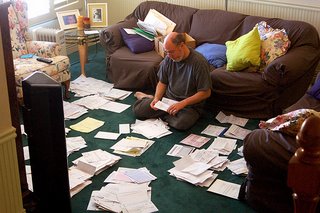Skyrocketing Property Taxes Squeeze Out Homeowners
 Critics call it the biggest and the sneakiest tax grab in recent memory.
Critics call it the biggest and the sneakiest tax grab in recent memory.From Vancouver to Halifax, Canadian homeowners are being hit with skyrocketing property assessments -- leading to significantly bigger property tax bills -- that some can't afford.
"I think we're going to have to sell," said David Diplock, an Ontario pensioner. "I've been retired 12 years. I don't have any way of getting a raise or any increases or anything."
Diplock and his wife have lived in their Port Colbourne area house for more than 30 years. They raised 11 children there. In the last few years, they say, the assessed value of their property has gone through the roof -- almost doubling -- to $337,000. They don't believe their "lived in" house is worth that much -- and they don't want to move anyway.
Their taxes are suddenly $6500 per year. The couple lives on Diplock's monthly Canada Pension -- and that tax bill now takes half of it.
"In my heart, it hurts," he said. "We start talking about it and (my wife) breaks down and I've got to comfort her and the next thing I know, I'll be breaking down because we feel we are being kind of robbed."
It's the downside of a housing market that's been on the upswing for the better part of a decade. The people hit hardest are the ones who don't want to sell -- many are seniors living on a fixed income.
"It should never be to the point where you have to struggle to pay your taxes," said Diplock.
The Canadian Taxpayers Federation calls it a national crisis. It estimates, on average, municipal property taxes have jumped by 24 per cent nationwide since 2000. The biggest increases are in cities -- like Vancouver, Toronto and Ottawa.
"It's a problem everywhere, right across Canada, but you know, no one is talking about it," said Garth Turner, Conservative MP for Halton, Ont. "It's very destructive for individual taxpayers and for many lives it ends up pretty much destroying them."
"If I had to, I couldn't afford to buy my own house," said Robert McBean, a retiree whose half duplex in Toronto has suddenly jumped $85,000 in value, on paper.
"There's been nothing done to my house. I didn't make any improvements. All I did was cut the grass."
"People think it's a windfall but if you have to pay the tax on that it's no longer a windfall."
Film studios have moved in near McBean's home. Several new houses have sprung up on the next block. "To give them (the city) extra tax money just because somebody moved in down the street and paid an unreasonable amount for a house, it's crazy," he said.
What's more, CTV found several examples of homes assessed for even more than they are likely worth. For example, In Toronto, several residents on O'Leary Avenue are fighting their property assessments. They have no parking, no yards and no garages. One of the homes recently sold for $168,000, yet the property value has been assessed at $255,000.
"Tax increases through the back door," said Turner, who is taking rising property taxes on as an issue. "It's very insidious. I think it's very harmful and it's really going to have a very negative impact on the whole system if we don't reform it now."
Turner thinks the new Conservative government he belongs to should insist municipalities get some of the money, in any new transfer payment deal made with the provinces.
"In Ottawa we are talking about, you know, cutting the GST or cutting income taxes. We are debating how to give money back to taxpayers. This is not even on the radar -- and its got to be. But it never will be, in politics, unless we have people screaming about it."
"It is a national problem," admits James Knight, CEO of the Federation of Canadian Municipalities (FCN). "Property tax is regressive and it's not linked to the ability to pay."
The FCN insists municipalities can't cut those taxes, though, without cutting services. So, nothing much will change, Knight said, until Ottawa and the provinces give up more cash.
"There's enough revenue in the country, there's enough taxes -- but there's not enough sharing of them," said Knight. "Municipal governments need somewhat more to deliver their responsibilities."
"Who can I level my anger towards?" asked David Diplock. He's filed an appeal of his assessment, but, he said, if he loses, he and his wife will have no choice but to sell the home they love -- the home they expected to live in for the rest of their lives.
"Someone else will buy the place, and they'll pay the taxes," said Diplock. "To sneak something like this under the table and rip everybody off -- I think it's criminal, really."
CTV


0 Comments:
Post a Comment
<< Home